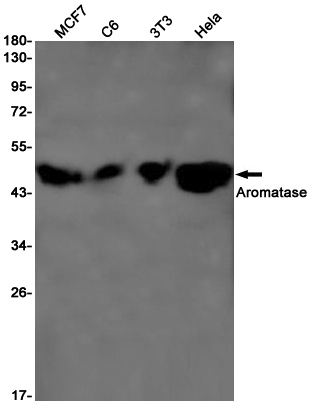
| WB | 咨询技术 | Human,Mouse,Rat |
| IF | 1/20 | Human,Mouse,Rat |
| IHC | 咨询技术 | Human,Mouse,Rat |
| ICC | 技术咨询 | Human,Mouse,Rat |
| FCM | 咨询技术 | Human,Mouse,Rat |
| Elisa | 咨询技术 | Human,Mouse,Rat |
| Aliases | CYP19A1; ARO1; CYAR; CYP19; Cytochrome P450 19A1; Aromatase; CYPXIX; Cytochrome P-450AROM; Estrogen synthase |
| Entrez GeneID | 1588 |
| WB Predicted band size | Calculated MW: 58 kDa; Observed MW: 50 kDa |
| Host/Isotype | Rabbit IgG |
| Antibody Type | Primary antibody |
| Storage | Store at 4°C short term. Aliquot and store at -20°C long term. Avoid freeze/thaw cycles. |
| Species Reactivity | Human,Mouse,Rat |
| Immunogen | A synthetic peptide of human Aromatase |
| Formulation | Purified antibody in TBS with 0.05% sodium azide,0.05%BSA and 50% glycerol. |
+ +
以下是3篇与Aromatase抗体相关的文献及其简要摘要:
---
1. **文献名称**:*Immunohistochemical localization of aromatase in human breast tissue using monoclonal antibodies*
**作者**:Sasano H, et al.
**摘要**:该研究开发了一种特异性识别人类芳香酶(aromatase)的单克隆抗体,并通过免疫组化技术在乳腺癌组织中发现芳香酶在肿瘤间质细胞中的高表达,为激素依赖性癌症的机制研究提供工具。
2. **文献名称**:*Characterization of polyclonal antibodies to human aromatase*
**作者**:Covaci A, et al.
**摘要**:文章报道了多克隆芳香酶抗体的制备与验证,通过Western blot和免疫荧光实验证实了抗体在检测不同物种(人、大鼠)芳香酶时的交叉反应性和特异性,支持其在跨物种研究中的应用。
3. **文献名称**:*Aromatase expression in endometriosis: validation of anti-aromatase antibodies for research and diagnostic applications*
**作者**:Bulun SE, et al.
**摘要**:研究验证了一种新型芳香酶抗体在子宫内膜异位症组织中的敏感性,证明其可用于定量分析芳香酶的异常表达,并探讨了其作为潜在治疗靶点的价值。
---
这些文献涵盖了抗体的开发、特异性验证及在疾病研究中的应用,可作为相关实验的参考依据。如需具体期刊信息或发表年份,可进一步检索PubMed或ScienceDirect等数据库。
Aromatase antibodies are essential tools in studying the aromatase enzyme, a member of the cytochrome P450 superfamily (CYP19A1), which catalyzes the conversion of androgens (e.g., testosterone) into estrogens (e.g., estradiol). This enzyme plays a critical role in steroidogenesis, particularly in regulating estrogen levels in reproductive tissues, the brain, and adipose tissue. Aromatase's involvement in hormonal homeostasis, sexual differentiation, and pathologies like breast cancer, endometriosis, or estrogen-dependent disorders has driven extensive research interest.
Antibodies targeting aromatase are typically generated against specific epitopes, such as the C-terminal region or conserved domains, enabling the detection and quantification of the enzyme in various experimental models. These antibodies are widely used in techniques like Western blotting, immunohistochemistry (IHC), immunofluorescence (IF), and ELISA to study tissue-specific expression patterns, cellular localization, and regulatory mechanisms. For instance, in breast cancer research, aromatase antibodies help assess enzyme overexpression in tumor tissues, informing therapeutic strategies involving aromatase inhibitors.
Validation of aromatase antibodies includes testing specificity via knockout controls or siRNA silencing to confirm minimal cross-reactivity with related proteins. Species reactivity (human, rodent, etc.) and compatibility with formalin-fixed or frozen samples are also critical considerations. By enabling precise tracking of aromatase expression, these antibodies contribute to understanding endocrine signaling, developmental biology, and disease mechanisms, underscoring their importance in both basic and clinical research.
×